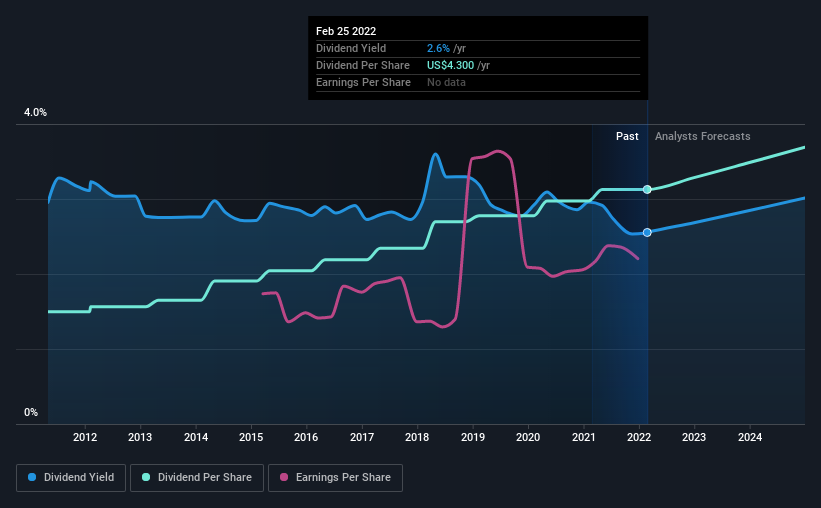Four Days Left Until PepsiCo, Inc. (NASDAQ:PEP) Trades Ex-Dividend
PepsiCo, Inc. (NASDAQ:PEP) is about to trade ex-dividend in the next 4 days. The ex-dividend date is one business day before a company's record date, which is the date on which the company determines which shareholders are entitled to receive a dividend. The ex-dividend date is important because any transaction on a stock needs to have been settled before the record date in order to be eligible for a dividend. This means that investors who purchase PepsiCo's shares on or after the 3rd of March will not receive the dividend, which will be paid on the 31st of March.
The company's next dividend payment will be US$1.08 per share, on the back of last year when the company paid a total of US$4.30 to shareholders. Based on the last year's worth of payments, PepsiCo stock has a trailing yield of around 2.6% on the current share price of $168.38. If you buy this business for its dividend, you should have an idea of whether PepsiCo's dividend is reliable and sustainable. So we need to investigate whether PepsiCo can afford its dividend, and if the dividend could grow.
Check out our latest analysis for PepsiCo
Dividends are typically paid from company earnings. If a company pays more in dividends than it earned in profit, then the dividend could be unsustainable. Its dividend payout ratio is 77% of profit, which means the company is paying out a majority of its earnings. The relatively limited profit reinvestment could slow the rate of future earnings growth. We'd be worried about the risk of a drop in earnings. Yet cash flows are even more important than profits for assessing a dividend, so we need to see if the company generated enough cash to pay its distribution. Over the last year, it paid out more than three-quarters (83%) of its free cash flow generated, which is fairly high and may be starting to limit reinvestment in the business.
It's encouraging to see that the dividend is covered by both profit and cash flow. This generally suggests the dividend is sustainable, as long as earnings don't drop precipitously.
Click here to see the company's payout ratio, plus analyst estimates of its future dividends.
Have Earnings And Dividends Been Growing?
Stocks in companies that generate sustainable earnings growth often make the best dividend prospects, as it is easier to lift the dividend when earnings are rising. Investors love dividends, so if earnings fall and the dividend is reduced, expect a stock to be sold off heavily at the same time. With that in mind, we're encouraged by the steady growth at PepsiCo, with earnings per share up 4.6% on average over the last five years. A high payout ratio of 77% generally happens when a company can't find better uses for the cash. Combined with slim earnings growth in the past few years, PepsiCo could be signalling that its future growth prospects are thin.
Another key way to measure a company's dividend prospects is by measuring its historical rate of dividend growth. In the past 10 years, PepsiCo has increased its dividend at approximately 7.6% a year on average. We're glad to see dividends rising alongside earnings over a number of years, which may be a sign the company intends to share the growth with shareholders.
Final Takeaway
From a dividend perspective, should investors buy or avoid PepsiCo? Earnings per share growth has been unremarkable, and while the company is paying out a majority of its earnings and cash flow in the form of dividends, the dividend payments don't appear excessive. While it does have some good things going for it, we're a bit ambivalent and it would take more to convince us of PepsiCo's dividend merits.
However if you're still interested in PepsiCo as a potential investment, you should definitely consider some of the risks involved with PepsiCo. Case in point: We've spotted 1 warning sign for PepsiCo you should be aware of.
If you're in the market for strong dividend payers, we recommend checking our selection of top dividend stocks.
Have feedback on this article? Concerned about the content? Get in touch with us directly. Alternatively, email editorial-team (at) simplywallst.com.
This article by Simply Wall St is general in nature. We provide commentary based on historical data and analyst forecasts only using an unbiased methodology and our articles are not intended to be financial advice. It does not constitute a recommendation to buy or sell any stock, and does not take account of your objectives, or your financial situation. We aim to bring you long-term focused analysis driven by fundamental data. Note that our analysis may not factor in the latest price-sensitive company announcements or qualitative material. Simply Wall St has no position in any stocks mentioned.

 Yahoo Movies
Yahoo Movies 

